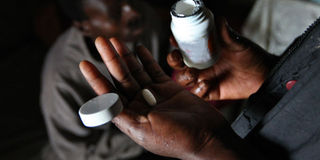Doctors, researchers advise on improving uptake of ARVs

Treating HIV positive people with ARVs, even if their CD4 count is above 350, helps reduce transmission of the virus.
Medical doctors and researchers on HIV/Aids have said addressing stigma and implementing community community-integrated service delivery models are effective strategies to improve retention on HIV care and adherence to anti-retroviral drugs (ARVs).
They were commenting on the Annual Health Performance Report for 2022/2023 financial year, which showed that retention on anti-retroviral therapy (ART), was declining, with 23 percent of the persons living with HIV dropping out of ART by June 2023.
The dropout rates were highest among adolescents at 27 percent, meaning the risk of disease progression and death is higher, in addition to high risk of transmission because of their high viral load.
Dr Getrude Namale, a researcher at the Medical Research Council/Uganda Virus Research Institute (UVRI), told this publication yesterday that addressing stigma associated with HIV is essential in improving the uptake of anti-retroviral drugs (ARVs) in patients.
“There are many factors [that affect retention on HIV care] but mainly the stigma associated with having HIV. Forgetfulness of patients where most patients forget to take their medicine on time and non-adherence, especially among the children and adolescents has partly contributed to the low uptake of these pills,” Dr Namale said.
The researcher also said there is the problem of non-disclosure, where most patients do not want to disclose to their relatives, friends and families.
“They fear to be isolated. Yet if they disclose to their immediate family they will be always reminded to take their medicine,” the researcher added.
Dr Namale also urged the government to invest more in awareness to reduce stigma and community integration of HIV services where medicine is delivered closer to patients.
“Community integration means you bring services closer in the community. The Ministry of Health already has a system where there are community distribution points where we can take the drugs and people get instead of incurring costs to come to the facility which may be far from their homes,” the researcher noted.
“Non-disclosure patients need to be guided and assisted by their immediate friends or relatives, families and be supported psychologically,” she added.
Mr Jonan Tumwesigyire, a researcher from Mbarara University of Science and Technology, said: “Many people don’t want to be associated with HIV even if it has been here for a long time.”
“Intensifying awareness so that people get in and start taking up medicine [should be done]. People should get used to knowing that HIV is here,” he said yesterday.
He added: “The ministry has done its part because the medicine and health workers are in health facilities but the challenge is that, there are personal factors and they can be addressed in awareness. We have to continue talking about it and people start taking the drug.”
Schools and homes
Dr Herbert Luswata, the secretary general of the Uganda Medical Association, on the other hand, said parents and schools have a big role to play in improving the retention on HIV care, especially among adolescents.
“Adherence to ART for adolescents has always been a problem because they fear their boyfriends, and their friends at home or school knowing that they are HIV positive by taking ARVs,” he said.
Mr Luswata added: “We give them drugs during their adolescent clinics. But also at home, the parents have to continue talking to these adolescents so that they can help them to be confident to continue taking their medicines. ”
He said adolescents should be allowed to keep their drugs while at school.
“ Usually, what they do, is that they put them in tins that are not for ARVs so that when they are taking, nobody knows they are taking ARVs. But school nurses should be able to know the learners who are on ARVs and find out every month whether they are adhering to treatment,” Dr Luswata said.
Uganda Aids Commission says about 1.4 million people are living with HIV. Of these, 1.2 million are on ART.





